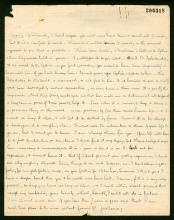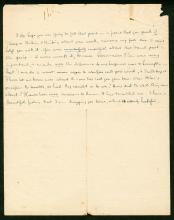BRACERS Record Detail for 19322
To access the original letter, email the Ready Division.
"Sunday My Beloved, I don't suppose you will ever have time to read all I write, but it is a comfort to write—"
There are two transcriptions (different typings; same text) of this letter. In both cases the text has been edited from the original with regard to what has been written about Miles Malleson; there are other changes as well.
Document .052412, record 99873; document .201116, record 116325.
Letter 43
BR TO CONSTANCE MALLESON, [21? JULY 1918]
BRACERS 19322. AL. McMaster
Previous Brixton letter, BRACERS 19320; next letter, BRACERS 46928
Edited by K. Blackwell, A. Bone, N. Griffin and S. Turcon
<Brixton Prison>1
Sunday2
My Beloved,
I don’t suppose you will ever have time to read all I write, but it is a comfort to write. I have such endless leisure, and writing is the nearest approach to you that is possible. I have been reading Mirabeau’s letters to Sophie when they were both in prison.3 I will give it to you Wed. — Read the Introduction, and as much of the letters as you find interesting. You would have been desperately in love with him if you had known him. I read years ago Sophie’s letters to him4 — the Introduction to this book is inaccurate, and not fair to her. It is horrible to see a really great love destroyed by violent separation, as was done in their case. It is partly the impression which their story made upon me that has made me so determined not to spend a long time in prison if I can possibly help it. Love when it is serious and deep and strong is a precious thing in the world — more precious by far than mere human life — and I want to keep it alive, and not let it be killed by force. I want it to be always a background to everything else. I want all the adventure and stress of your life to go on, but I want you to know I am always there for you. Your life will have to be full of adventure, and sometimes I shall find it very trying, but I have realized now how necessary and unavoidable it is — your instinct is on the look-out for experience, and must have it. But if I don’t prevent your getting experience, I don’t see why anything should bring things to an end between us. I don’t believe in your feeling for me just fading away, as your feeling for Miles has, because I think you and I have a deeper bond than you and he could ever have had. I mean, if it is in any way possible, to keep your love as long as I live — and I think nothing would prevent that except my curtailing your liberty, which, honestly, I will not do in future. I am so much more sure of your love than I was a year ago that I am much less prone to the more violent forms of jealousy.5
I do hope you are going to get that part in a farce that you speak of.6 I keep on thinking and thinking about your work, cursing my fate7 that I can’t help you with it. You were wonderfully unselfish about that French part in the spring8 — it was worth it, because Boismaison then was very important, and made all the difference to my happiness now and hereafter — but I made a vow never again to interfere with your work, and I will keep it. Please let me know more about the row that lost you your tour.9 Was Miles’s pacifism the trouble, or had they caught on to me? How did the whole thing come about? I have been very anxious to know. It has troubled me. I have a dreadful feeling that I am dragging you down, which is utterly hateful.
- 1
[document] The letter was edited from the unsigned, handwritten original in the Malleson papers in the Russell Archives. It is written on both sides but only half-way down the verso of the sheet of thin, laid paper, ruled on one side and folded twice, so that there was no writing on either exposed quarter of the sheet.
- 2
[date] Colette’s note clipped to the letter reads: “This might be Sunday 21st July 1918. CM”.
- 3
reading Mirabeau’s letters to Sophie when they were both in prison BR had already, very early in June 1918, written Colette Letter 11 disguised as one from Mirabeau to Sophie de Monier (sic). The letters of the French revolutionary statesman, the Comte de Mirabeau (1749–1791), written when he was imprisoned in the castle at Vincennes, were first published in 1793. “Sophie” was the name he used for Marie Thérèse de Monnier (1754–1789) during their illicit affair. An edition is Benjamin Gastineau, Les Amours de Mirabeau et de Sophie de Monnier, suivis des lettres choisies de Mirabeau à Sophie, de lettres inédites de Sophie, et du testament de Mirabeau par Jules Janin (Paris: Chez tous les libraires, 1865). BR wrote to others about Mirabeau at this time: to Frank he wrote on 22 July 1918 (Letter 44) about Mirabeau’s death; in Letter 48 he wrote Ottoline that he was reading an unidentified three-volume Mémoire of Mirabeau.
- 4
I read years ago Sophie’s letters to him A selection of her letters was published in Paul Cottin, ed., Sophie et Mirabeau d’après leur correspondance secrète inédite (Paris: Plon-Nourrit, 1903). Cottin published more letters in the journal La nouvelle revue rétrospective, Paris, in 1903–04.
- 5
more violent forms of jealousy In 1917 BR was very jealous of Colette’s relationship with her director, Maurice Elvey. BR wrote her on 24 September (BRACERS 19218) that it had “robbed me of sleep, and when I don’t sleep I cease to be quite sane.” The following day he wrote a savage assessment of her character, “What She Is and What She Might Become” (RA2 710.201999). He called her vain, crude, commercial and destitute of self-control. Presumably the episode was what BR had in mind when writing in this letter of his proneness to “the more violent forms of jealousy”, rather than physical violence, of which abuse there is no hint anywhere in their correspondence.
- 6
get that part in a farce that you speak of On 21 June Colette sent a message (in Rinder’s letter to BR, BRACERS 79616) that she had two or three jobs under consideration. The title of the farce she mentioned is unknown. Then, in July, she noted that an American, Colonel J. Mitchell, whom she met at a luncheon party hosted by her mother at Claridges on 17 July, told her that an underling of his had done her out of a job (BRACERS 113143). On 3 August (BRACERS 113147), she wrote: “I am going to be very poor until at least the spring.”
- 7
cursing my fate Shakespeare’s famous Sonnet 29 has a line, “And look upon myself, and curse my fate” (“All the Poems We Have Most Enjoyed Together”: Bertrand Russell’s Commonplace Book, ed. K. Blackwell [Hamilton, ON: McMaster U. Library P., 2018], p. 64; the “we” being Ottoline and BR).
- 8
that French part in the spring Colette had given up a part in Eugene Brieux’s play Blanchette in order to go to Ashford with BR.
- 9
the row that lost you your tour In her letter of 26 July (BRACERS 113145), Colette explained it as follows: “Miles had seen a great deal of Marie <Blanche> at her theatre; and her manager — that same infernal big-wig — dislikes Miles and his politics; and my politics, of course, too. So his general displeasure got vented on me, as he’d not wish to vent it on Marie, and couldn’t vent it on Miles. Of course you didn’t come into it at all.”


